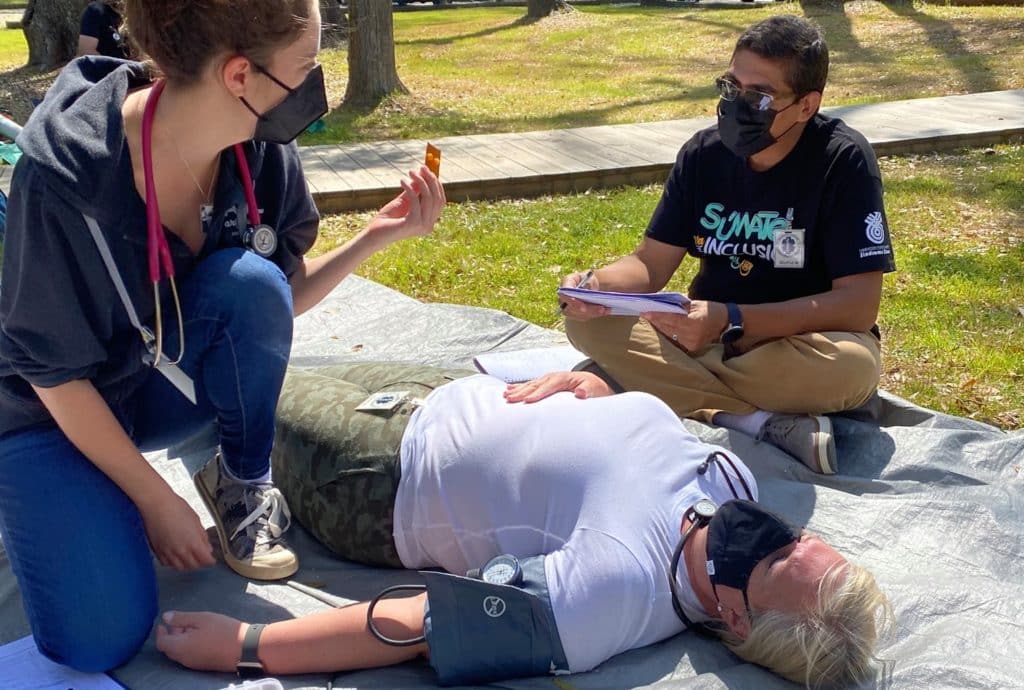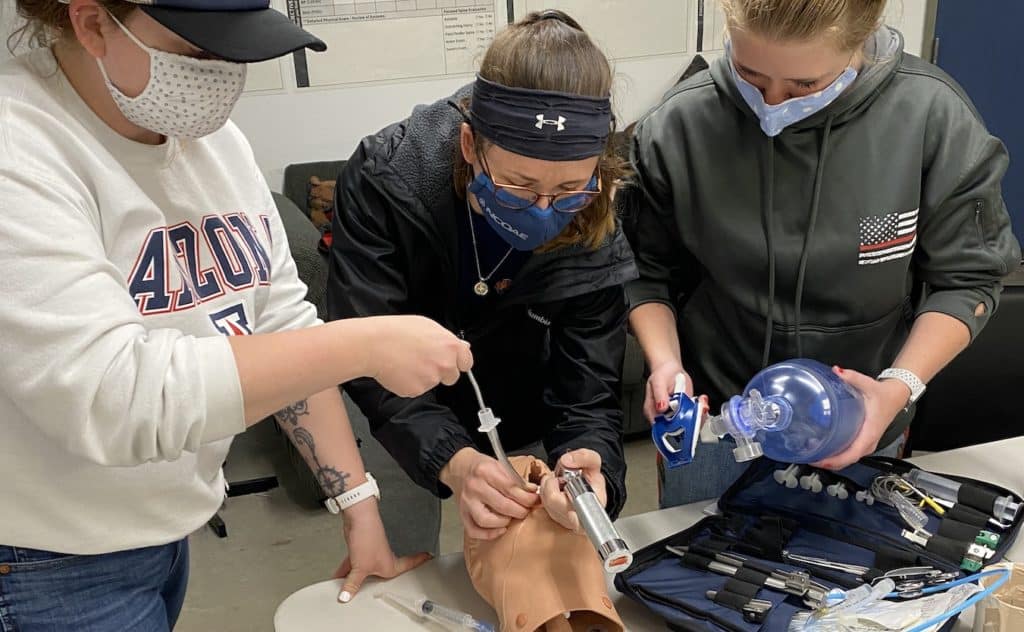8 Alternative Jobs to Pursue with an EMT Certification
EMT TrainingJust obtaining an Emergency Medical Technician (EMT) license opens a world of career possibilities both inside and out of the medical field. Sure, you have to put in the effort, but the opportunities are as diverse as our EMT students here at The National Center for Outdoor & Adventure Education (NCOAE).
Fact is, we receive applications from students from all walks and stages of life, who successfully complete our EMT training program and go on to use that EMT training for a variety of opportunities. Some become full- or part-time EMTs, others use this outstanding training and education as a steppingstone for medical or nursing school. And then there are the outdoor enthusiasts who use this EMT training to become Ski Patrollers or members of Search and Rescue crews, or to add an additional layer of medical expertise when guiding groups on mountaineering and backcountry expeditions.
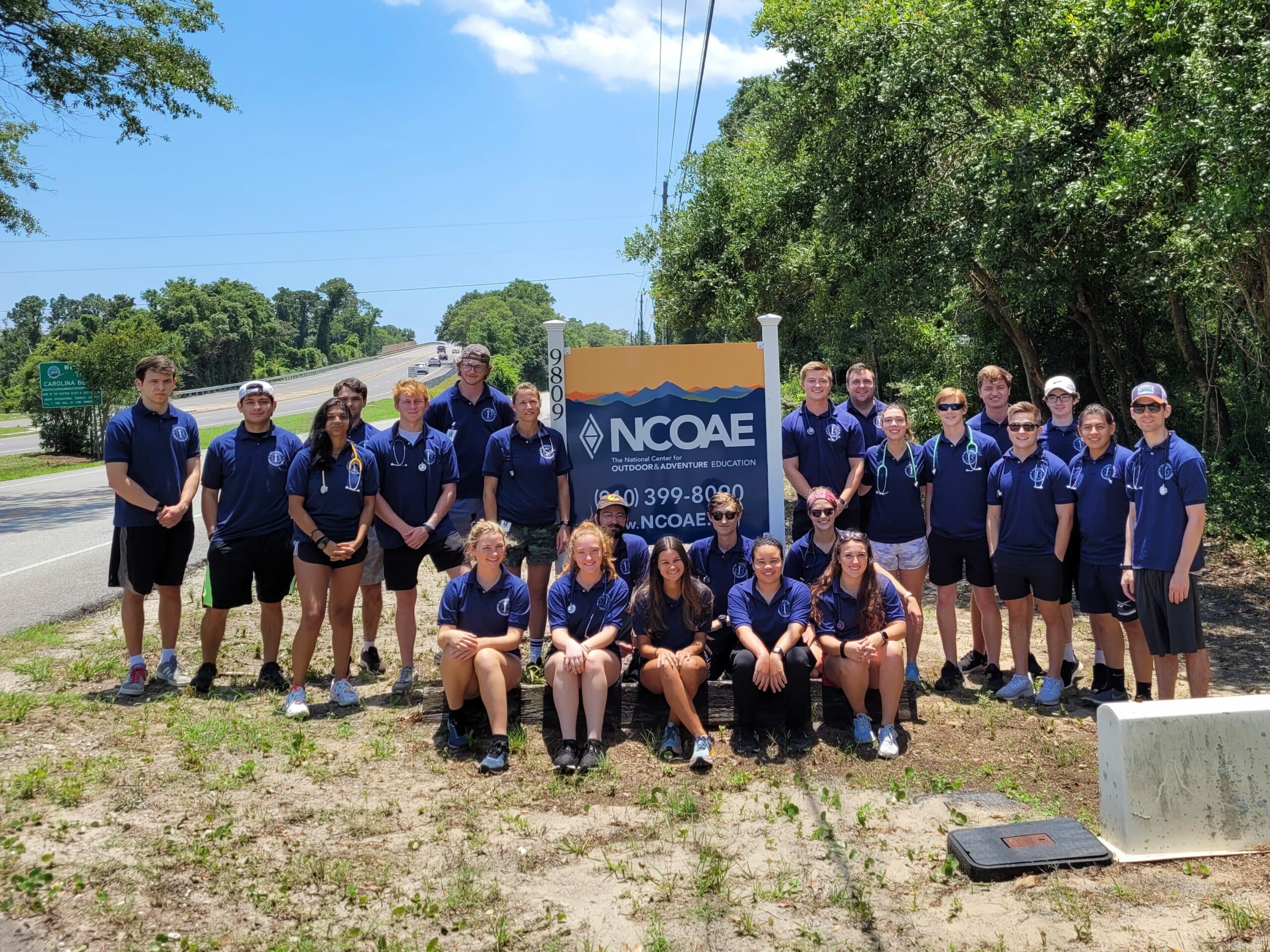
Maybe you’ve been an EMT for a while and are looking for a change, Or maybe you’re thinking about obtaining your EMT certification and then consider your options. While the most popular career trajectory for EMTs is to become a Paramedic, there are a number of jobs that you can obtain with just an EMT certification, keeping mind that some may require additional training.
Here are eight such opportunities: (more…)
Most EMS Terminology Comes Down to Initials, Abbreviations and Acronyms
EMT TrainingA few years ago, we ran a three-part series on slogans, slang, and terminology as it applies to a trio of human-powered outdoor recreational activities. If you recall, we started out with some “gnarly” surfing terms, then we “tied in” to a conversation about climbing, finally pulling a “wet exit” on the language of paddling.
You can review these three articles using the links below:
- From Sept. 20, 2020: Surfing Terminology and Slang: You Can’t Play BINGO Without the Lingo
- From Oct. 10, 2020: On Belay — Climbing Terminology and Slang
- From Oct. 30, 2020: Paddling Terminology and Slang: Nobody Says ‘Up a River Without an Oar’
There was quite a bit of word whimsy in those articles, and we made sure to remind readers that successfully lassoing the linguistics of a particular activity was no guarantee you were mastering that particular sport professionally.
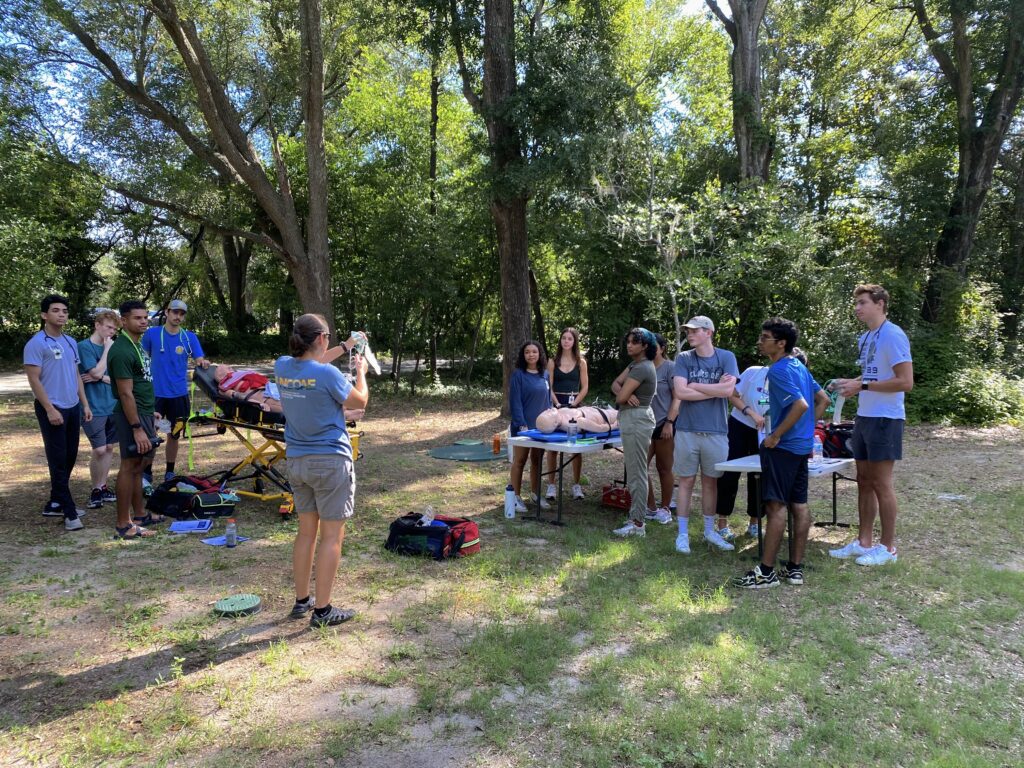
Today we’re taking a more serious look at language, this time highlighting the terminology used by members of the Emergency Medical Service (EMS) community. That’s because one of our areas of focus here at The National Center for Outdoor & Adventure Education (NCOAE) is emergency medicine training and education. And whether you’re an EMS, medical professional, or wilderness first responder (WFR), these terms are most often employed when these professionals find themselves managing a medical emergency.
First off, you might notice that most of these terms come in the form of acronyms, abbreviations, and initials, and the reason for that is to enable first responders to quickly communicate and react with each other and the patient in the field.
The source for these acronyms comes from the NCOAE Wilderness Medicine Field Guide (ISBN 978-0-578-87449-4).
Here, we present them in alphabetical order: (more…)
NCOAE’s EMT Training Opens the Doors to Jobs Across the U.S.
EMT TrainingApplicants to our nationally renowned EMT training courses often ask us if they can take
their new EMT credentials to the state where they live, and the answer is mostly yes.
The National Center for Outdoor and Adventure Education’s (NCOAE) campus is
located in North Carolina, where we offer 21-day “Intensive” EMT-Basic and 23-day
“Intensive” Advanced EMT training courses among others. Successful completion of
these courses authorize our graduates to take the National Registry of Emergency
Medical Technicians (NREMT) exam.
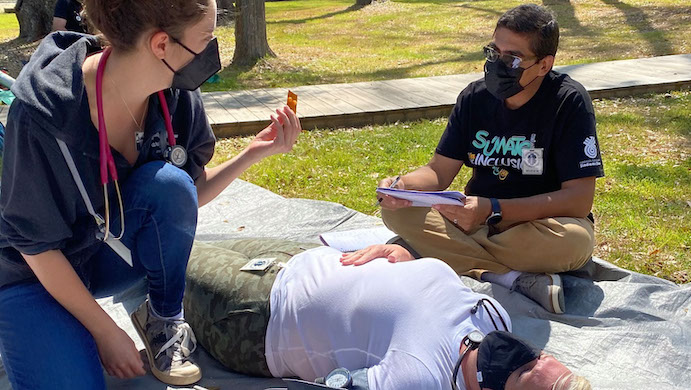
National Registry Certification examinations evaluate the competence of EMS
practitioners at a variety of levels, including Emergency Medical Responder (EMR),
Emergency Medical Technician (EMT), Advanced Emergency Medical Technician
(AEMT), and Paramedic.
NREMT credentials are either required for an initial license or accepted for legal
recognition or reciprocity in all 50 states and Puerto Rico. That makes it easier to
maintain
It Took a Pandemic to Shine the Spotlight on Our Nation’s EMTs
EMT TrainingEmergency Medical Services personnel (EMS) have been on the front lines of the COVID health pandemic for 18 months now, with no end in sight. These key healthcare providers continue to adapt to an ever-changing work environment and thus far have maintained a high level of care.
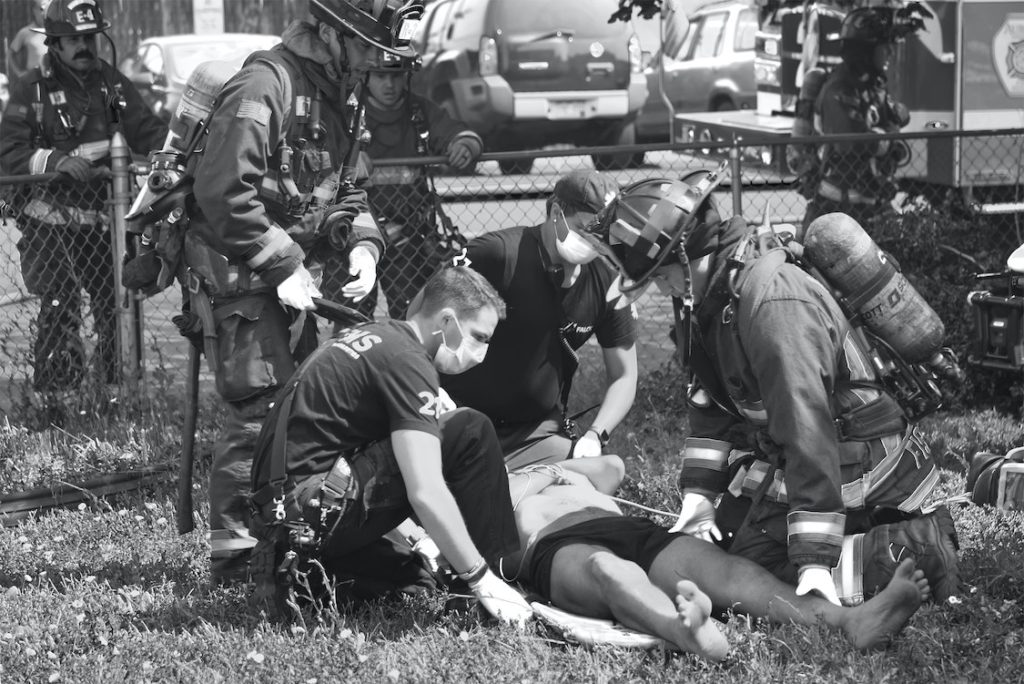
If you’re thinking of entering the field of EMS, know this: The need is greater than ever. That given, what should you know about EMS in the era of COVID? Below are thoughts from the experts here at The National Center for Outdoor & Adventure Education (NCOAE), where we offer a number of training options to prepare future EMTs for what lies ahead.
To get us started, let’s take a look at PPEs.
Personal Protective Equipment (PPE): For years most EMS providers considered “PPE” to mean “Exam Gloves.” No longer. Today, you’ll most likely be required to wear an N-95 respirator and eye protection for an entire 12-hour shift. You can probably also add a gown and potentially additional layers to that ensemble. It’s hot and uncomfortable and no one enjoys it. But we’ve shown it can be done, and that it’s being done to good effect.
(more…)Signs That an Intensive EMT Training Course Might be Right for You
EMT TrainingIntensive is one of those words that, when you say it out loud or write it down, sounds foreboding or, as the word itself suggests, promotes a feeling of tenseness. However, when we talk about completing an intensive EMT training course here at The National Center for Outdoor & Adventure Education (NCOAE), the word is not meant to scare you off.
Instead, it’s intent is to communicate the level of dedication you’re capable of putting into such a program, given the brief timeframe allotted for the program. And by brief, consider this: You can complete a high school EMT program in about a year. A university college course typically takes about six months to complete, and a community college course normally takes a semester.
However, to complete an intensive EMT course, such as those offered here at NCOAE, the work can be completed in just 21 days. That’s three short weeks. Boom! Done! Let me take the National Registry of Emergency Medical Technicians (NREMT) exam!
Benefits of the Intensive Approach to EMT Training
Know this: With an intensive program, you’re going to learn everything you need to know to take and pass the NREMT exam, and you’re going to learn it quickly. Just be prepared to take in a lot of information in a short amount of time. Here are a few of the advantages of intensive learning: (more…)
How to Become an EMT
EMT TrainingYou’re thinking about becoming an EMT. Awesome! If you follow through, you will be joining the ranks of today’s modern-day heroes, the frontline of the frontline workers — bona fide life savers!
Emergency Medical Technicians (EMTs) are trained professionals who provide care in critical and emergency situations. Such emergencies can range from simple, routine calls to intense and complex scenarios.
You may show up for a call only to discover that there is no victim, or the person is okay and refuses help, or a patient simply needs transportation from one medical facility to another. On the other hand, you could be called in to attend to the victim of a car accident or a shooting or a heart attack, drowning, mountaineering accident, or drug overdose. You may even have to deliver a baby! You can never predict what will happen over the course of any given shift.
As an EMT, your job responsibilities generally boil down to keeping patients alive using non-invasive medical procedures and transporting them safely to a hospital or clinic where they can receive a higher level of professional medical care. More specifically, you have three fundamental job responsibilities:
- Assessment and stabilization of the patient’s condition
- Basic life support
- Transportation
In this post, we bring you up to speed on the different levels in emergency medicine and credentialing while explaining the basic education and skills required to become an EMT.
(more…)TALK TO US
Have any further questions about our courses, what you’ll learn, or what else to expect? Contact us, we’re here to help!
